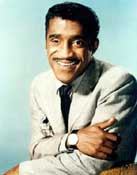Son of a black vaudeville star and a Puerto Rican dancer, Sammy Davis Jr. became a world-class actor, singer and dancer. At the age of four he starred in a short act called "Will Mastin's Gang, featuring Little Sammy."
In 1932 he made his debut in the Warner Brothers film Rufus Jones for President. Davis played the part of Rufus, a little boy who dreams of becoming President one day. He continued appearing with the Will Maustin Gang throughout the 1930s.
In 1943 he was drafted to serve in a Special Forces unit during World War II. Davis' autobiography Sammy: An Autobiography, describes in detail the racial prejudice he encountered during his years in the army. This racial prejudice continued throughout his career and lifetime. After the war he was supposed to be cast with Elvis Presley, another war veteran, for Stanley Kramer's The Defiant Ones. At the last minute the casting was changed, however. Presley later confided to Davis that the change of casting was racially motivated.
Despite these challenges, Davis' career flourished. In 1946 he recorded "The Way You Look Tonight" with Capitol Records. A few years later he opened for Frank Sinatra at the Capitol Theatre in New York. Sinatra and Davis continued their friendship for many years.
Soon after, Davis landed a tour with Mickey Rooney and appeared with Bob Hope in a benefit show. The three performers appeared together at Circo's in Hollywood and on the Colgate Comedy Hour. Davis appeared solo at the Capacabana in New York, and was discovered by Decca Records in 1954. He released two albums with Decca Records: Starring Sammy Davis, Jr. and Just for Lovers.
Davis' career took off in the mid-50s. He appeared on Broadway with the Will Mastin Trio (formely the Will Mastin Gang) in 1956 in Mr. Wonderful. He made solo appearances on the Ed Sullivan Show. He performed in The Benny Goodman Story (1955) and Porgy and Bess (1959). His "Rat-Pack" group of Dean Martin, Frank Sinatra, Joey Bishop, and Peter Lawford starred with him in Ocean's Eleven (1960), Sergeants Three (1962), and Robin and the Seven Hoods (1964). Davis also starred in two serious dramas of Anna Lucasta (1958) and A Man Called Adam (1966). He appeared again on Broadway in 1964 in a musical version of Clifford Odets drama Golden Boy. In 1972 Davis made a No. 1 hit on the Top 40 charts with "Candy Man."
In 1954 he almost died in a car accident where he lost his left eye. While in the hospital, his friend Eddie Cantor enlightened him on the similarities between the Jewish and black cultures. Davis converted to Judaism after reading Paul Johnson's A History of the Jews in the hospital. One paragraph about the ultimate endurance of the Jewish people intrigued him in particular: "The Jews would not die. Three centuries of prophetic teaching had given them an unwavering spirit of resignation and had created in them a will to live which no disaster could crush."1
As an African-American, his later affiliation with Judaism sometimes caused him personal anguish. The Jewish community never fully embraced him as a member. After his marriage to Swedish actress May Britt and involvement in the Republican Party, the African-American community ostracized him.
Sammy Davis Jr. continued performing well into the 1980s, despite heavy drinking and drug use which contributed to his poor health. In the early 1980s he performed in two Cannonball Run films with Dean Martin. In 1989 he performed in the movie Tap with Gregory Hines and then traveled on tour with Frank Sinatra and Dean Martin.
He died from throat cancer in 1990.
